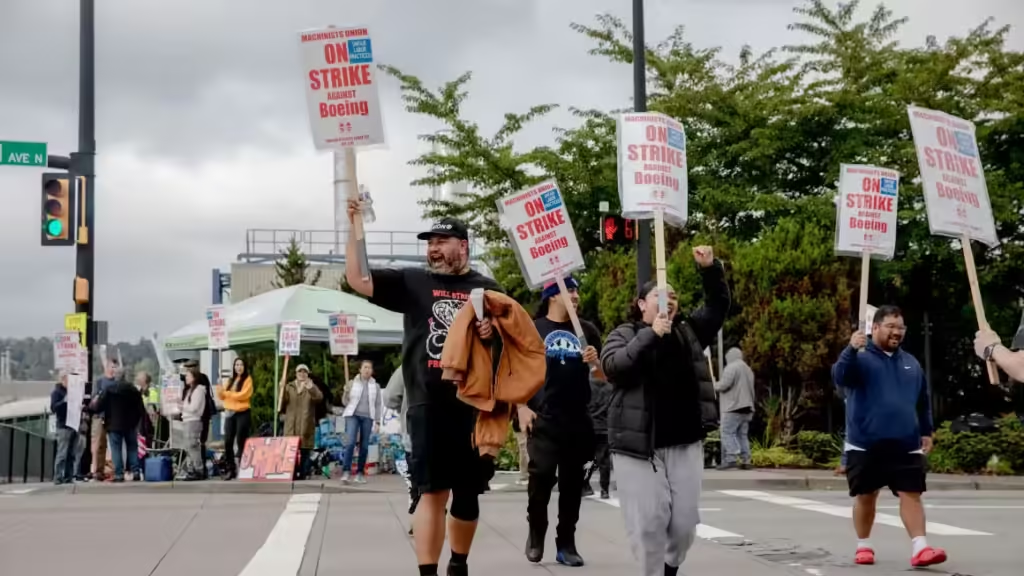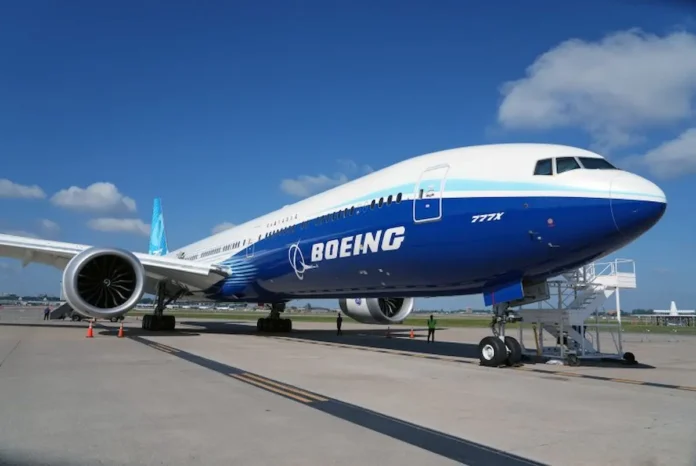New York (NY Breaking News)— Boeing reaches tentative union deal has been going stocked and loss $1B Monthly. A preliminary agreement has been struck to terminate the five-week strike at ailing airplane manufacturer Boeing, the union reported to its 33,000 striking members early Saturday.
The agreement must still be approved by a majority of the International Association of Machinists’ rank-and-file members before it can go into force and workers may return to work. The union vote Boeing will have its vote on Wednesday.
The walkout has dealt a significant damage to an already faltering corporation, which, despite recent troubles, remains an important component of the US economy. Boeing is America’s biggest exporter, contributing an estimated $79 billion to the U.S. economy each year, directly and indirectly supporting 1.6 million employment at 10,000 suppliers located in all 50 states.
The walkout happened barely a month after Kelly Ortberg, the company’s new CEO, took over. Kelly Ortberg Boeing has claimed that he wants to “reset” the union-company relationship.

Rank-and-file employees had previously virtually unanimously rejected a prior preliminary deal, prompting the company’s first strike in sixteen years. However, the union said that the new offer is worthy of being presented to a vote by the membership.
The union said that the offer would enhance earnings by 35% throughout the contract’s four-year term. It will also enhance employer payments to members’ 401(k) plans, but it will not reinstate the conventional pension plan that was removed from union members ten years ago. Many union members were outraged over the loss of their pensions.
The union thanked Acting Labor Secretary Julie Su for brokering the agreement via indirect negotiations between the union and management. Su also mediated the conclusion of an International Longshoremen’s Association strike at dozens of ports on the East and Gulf Coasts earlier this month, after a three-day walkout.
BOEING Reaches Tentative Deal Struck: Increasing losses from strike
“We are looking forward to our employees voting on this negotiated proposal,” Boeing stated in a statement. The short note seems to acknowledge that a support of the agreement might ignite pushback from union members, who have had a strained relationship with the company’s management.
According to Standard & Poor’s, the corporation has been losing an estimated $1 billion per month as a result of the strike, in addition to its existing losses. It has revealed intentions to eliminate 10% of its worldwide workforce, or around 17,000 of its 171,000 employees. The strike has stopped manufacturing of virtually all of its commercial aircraft, and the corporation receives the majority of the proceeds from the sale of its planes upon delivery.
However, the company’s woes extend well beyond the consequences of the strike. It has been dealing with setbacks for more than five years, ever since two tragic accidents of its best-selling 737 Max in late 2018 and early 2019 resulted in a 20-month grounding of the aircraft. It has recorded losses totaling more than $33 billion since then, and has already said that it would declare another massive loss on Wednesday for the just-completed quarter, the majority of which occurred prior to the commencement of the strike on September 13.
The union’s statement did not explicitly endorse the deal that members would vote on. It just said that it “includes several key improvements” and that “it warrants presenting to the members and is worthy of your consideration.” The previous preliminary agreement was supported by union leadership as the finest deal ever made with Boeing, but it was decisively rejected by 95% of the membership.
The rejected offer would have boosted earnings by 25% throughout the course of the agreement. It would also have made minor changes to the 401(k) contributions and provided a $3,000 signing bonus. This offer includes a $7,000 signing bonus.
A week after the contract was rejected, Boeing increased its offer to 30% in compensation increases over the four-year period, calling it its best and last offer. It said that the union’s request for even higher salary increases was “far in excess of what can be accepted if we are to remain competitive as a business.”
Despite its financial woes, Boeing is able to pay union members much more since worker pay and benefits account for just a tiny portion of the cost of constructing a jet that may sell for tens of millions of dollars or more. The majority of the money goes to raw materials and suppliers, who offer many of the pre-assembled elements, including the plane’s body. The final assembly will be handled by the 33,000 workers on strike (Boeing job losses).
Furthermore, the present financial crisis is unlikely to push Boeing out of business. Boeing and its European competitor Airbus are the only businesses that manufacture full-size aircraft for the worldwide airline sector. Its status as part of a duopoly almost guarantees its longevity.
For more than five years, Boeing has been coping with a series of problems, ranging from humiliating to catastrophic and all financially devastating. It has had two fatal crashes, a 20-month grounding of its best-selling plane, and numerous federal investigations into the quality and safety of its aircraft, all of which were triggered by a door plug that blew off an Alaska Airlines flight in January, an incident caused by the plane leaving a Boeing factory without the bolts required to keep it in place. It has agreed to plead guilty to misleading the Federal Aviation Administration during the first certification of the 737 Max.
